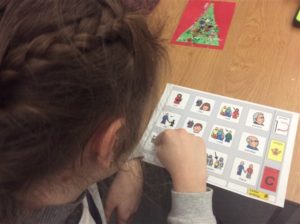Many of our learning activities have focused on life skills, and should be easy to include in daily routines without many / any resources. Below are a range of ideas and a sample of what a day might look like – please take from this anything that you find useful.
Communication
- Encourage your child to use their communication system throughout the day. (Cannot stress this one enough – insisting on communication device usage all day has seen incredible progress, we’d love to see this continue for when school re-opens!)
- Read a story together – there are signed stories on YouTube if you’re looking for something new! One example of many – https://bit.ly/3aj0z0L
- Share a signed song or two together – I’ve linked some class favourites: https://bit.ly/39468Pa
- Practice the Makaton “sign of the week” – https://wetalkmakaton.org/
- Bucket time – we know this has been popular with many of our young people so have put together a few videos showing bucket time if you’d like to try something similar at home. A more detailed explanation with video links is on a separate sheet. These are for your benefit, your child will respond more to your presence than a video.
- Role play – perhaps different jobs, perhaps different stories, perhaps something different but of particular interest to your child – we like our theme park role play in Class 15!
- Watch TV together, using your child’s communication system to talk together about what you see, what you like, what you don’t like, etc.

Food and drink
- Help to make breakfast / lunch / dinner
- Help to chop snack foods (safety, hygiene, not eating food before serving!)
- Using communication system to request snack foods.
- Explore how ingredients change when cooking (this is part of the ASDAN science module – if you’re super keen you could take a photo or write a wee note about what your child did and we can put it in their evidence folder!)
Life skills
- Washing hands – several in our class have been working on improving their hand washing skills prior to this, but this is an especially important time to build this skill. Encourage your child to rub soap into their hands.
- Getting dressed independently – this also includes opportunities for labelling body parts (and which ones are private and should be covered).
- Brushing teeth and washing faces.
- Going for a walk – stopping at the road, looking or listening for traffic, communicating when to “go!”
- Cleaning surfaces, washing the dishes, taking out the recycling.
- Matching coins, naming coins, helping to buy items at the pretend supermarket.
Creative arts
- Recreate trash band by making instruments from containers you have, pop on some favourite tunes and encourage your child to join in replicating rhythms. Communication work could include requesting a particular tune or commenting on the music they can hear.
- Draw, colour in, paint, collage – any materials can be used!
- Dance together – you can explore rhythm, communication, gross motor skills.
Outdoor ed
- Enjoy the great outdoors, talk about what you can see, hear, feel, touch.
- Talk about the weather, and if the weather means you can’t go outside perhaps you could recreate it indoors – water spray rain, torch (or mobile phone light) for sun, fan for wind.
Sensory regulation
Including sensory regulation activities will support our young people with their resilience at a challenging time.
- Explore preferred sensory resources – perhaps large, soft blankets, possibly shiny card, maybe a cold drink, or perhaps a material to stretch or rip.
- Messy play – brilliant for communication as well as sensory regulation! Squeeze mud in your hands, squirt shaving foam onto a table and draw shapes, or splash water in the sink.
- Listen to calming music in an otherwise quiet space, dim lighting and offer your child a hand massage.
Related
